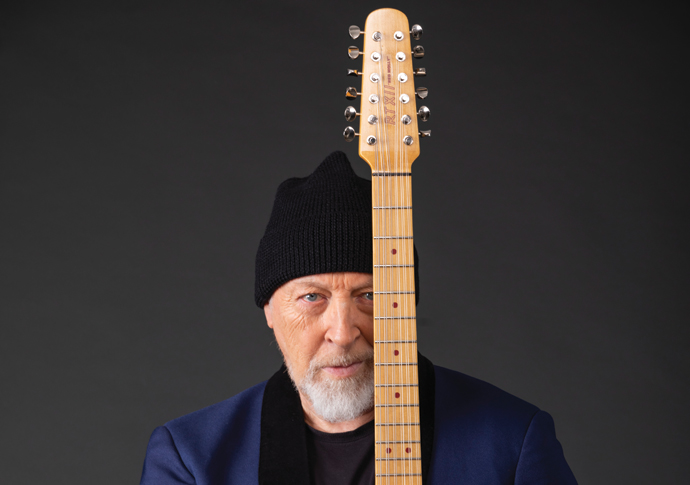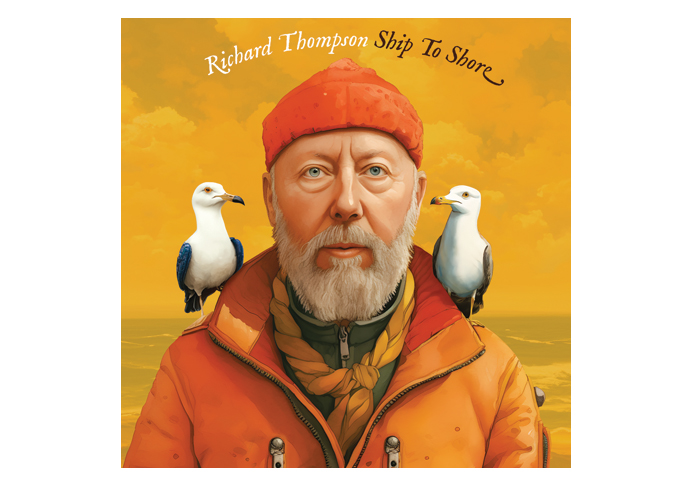‘I was the third best guitarist at Ellis’
Fairport Convention’s Richard Thompson celebrates his 75th birthday with a gig at the Royal Albert Hall in June. Dan Carrier takes the former William Ellis pupil down memory lane...
Thursday, 30th May 2024 — By Dan Carrier

Richard Thompson
RICHARD Thompson’s natural aptitude at running his fingers up and down a fretboard produced seven decades of joy for countless people – and was a key driver behind a whole genre.
Richard was the guitarist in the folk-rock band Fairport Convention, the 1960s north Londoners who turned a generation of music lovers on from British beat and rhythm and blues to a more lyrical and musically mature sound.
He celebrates his 75th birthday in June, and has gathered some favoured musicians to join him on stage at a gig at the Royal Albert Hall.
The former William Ellis School pupil, who grew up in Camden and lives in Hampstead, founded Fairport (named after the house in Muswell Hill where they jammed) aged 18 and the band has, in one form or another, remained active.
The guitarist was at Ellis, then a grammar school, between 1960 and 1967. It was there he cut his musical teeth with friends, but the masters were the products of a different era.
“Music was not very high up on the agenda – it was a grammar school thing. They had a bad school orchestra,” he recalls.
“We had an Austrian music master, who was only interested in teaching the history of Mozart. The guitar was not an instrument you would be encouraged to play.”
Despite the traditionally academic approach, among his peers was the classical guitarist Carlos Bonell, and Paul Lomax, who was good enough to showcase his skills on The Tonight Show aged 14.
“I was the third best guitarist at Ellis,” Richard jokes. “This dangerous world of pop music clashing with a grammar school bred a few rebels. Hugh Cornwell, from The Stranglers, was in a band with me. We were the class of 67 and when I look back a lot of my classmates do not take that road well travelled, the path to university. It was a time of psychedelics coming in and people considering the lives they wanted to live and alternative ways to do so.”
His sister introduced him to rock and roll and trad jazz, while a friend’s father was a music critic and handed over armfuls of singles he’d reviewed.
“We’d see what we could work out,” he remembers.
“We had rather interesting material for a school band, things like an obscure Kiki Dee B-side.”
All these influences led to Richard being at the forefront of British folk-rock, which found traditional songs and reinterpreted them.
“Blues and RnB were massive but I didn’t want to play just that,” he remembers.
“With Fairport, our heroes were the likes of Joni Mitchell and Leonard Cohen. We were a bit stoned and absent-minded and we wanted to be different. We decided to be a lyric-centred band.”
They had plenty of places to listen and perform in 1960s north London.
“We’d go to clubs such as Klooks Clique in West Hampstead, The Manor House in Finsbury Park, the Cooksferry Inn on the North Circular and the Country Club in Belsize Park,” he remembers.
“But most of all – the Marquee in Wardour Street. You’d see The Yardbirds and the Spencer Davis Group. The Who played every Tuesday.”

His new album, Ship to Shore
Richard has spent a lifetime writing music. He composed with band mates in Fairport, wrote as a duet in the 1970s when he teamed up with singer Linda Peters, and then enjoyed solo success.
“When I was 18, I’d have a few drinks and I’d write until 4am,” he said. “I’d fall asleep and never be quite sure of what I have written. I never knew if I was being creative or not. Now I can have songs on the go in various stages of composition – you can jump in and out and that helps with writer’s block.”
Writing music is not solely a case of sitting in a studio.
“I compose when I am walking down the street. It can feel much freer and easier not to be at an instrument,” he adds.
“You think of the idea and develop it, and then bring it to the instrument. I love the fleeting element of this part of composition.”
And using a piano, rather than his preferred guitar, helps.
He said: “Using a different instrument gives me a whole different way to approach notes and harmonies.
“For 65 years I have been a guitar player. My fingers fall into patterns, muscle memory is strong, and it is important you break that by going to another instrument.”
Because he has such a huge back catalogue, his songs are regularly performed by others.
“Joni Mitchell said giving people your songs is like sending your children away to live with a strange uncle for a few months and they come back smoking and swearing. There is always a bit of that.
“Sometimes it is horrible – they can completely miss the point and it does nothing to you. Or they do not re-interpret it at all – then you think, why bother?
“But it can also be wonderful. When someone does one of your songs differently, it can be so much fun.”
Richard has a history degree and is fascinated by musical heritage.
A request from a journalist prompted a long-running research project.
“It was 1999 and a magazine was planning its millenium issue,” he recalls. “They said ‘send us your top 10 songs of all time’. They didn’t, of course, mean of all time. But I went back 1,000 years. I started with a St Godric religious piece, a warning about hell. I went through the centuries. It was amazing what you find – what gets left by the wayside, forgotten about.
“They never published it – it was too eccentric – so I took it on the road with other musicians. We weren’t really qualified to play quite a lot of it but we had a good go. We did everything from traditional music from the 1200s to madrigals, Gilbert and Sullivan, the Ink Spots, right through to Britney Spears.
“Of course, music changes. That is its great strength but I also discovered some things never change. There were always love songs, political songs, and chord progressions, tones and melodies.”
As a performer who broke the American market, he understands the UK’s creative industries impact internationally.
“We do not recognise our soft power,” he said.
He believes we need to understand the impact arts have – not just for the sake of it, but economically.
“Every now and then the government interferes in education and says ‘we are not reaching targets – come on schools! Buck up!’” he says.
“The schools shit themselves, say they are going to concentrate on maths and English.
“Music and Latin get dumped. But it has been proven that it helps across the board. Both elevate your brain.”
And playing music brings vital lessons.
“It teaches you about making mistakes. You make a mistake and you move on, you move past it, you do not stop in the middle, and you go on to apply that to everything else in life,” he states.
“That is a wonderful thing to learn.”
• Richard Thompson’s new album Ship To Shore is released on May 31.
• His 75th birthday celebration show is at the Royal Albert Hall on June 8, www.royalalberthall.com/tickets/events/2024/richard-thompson/